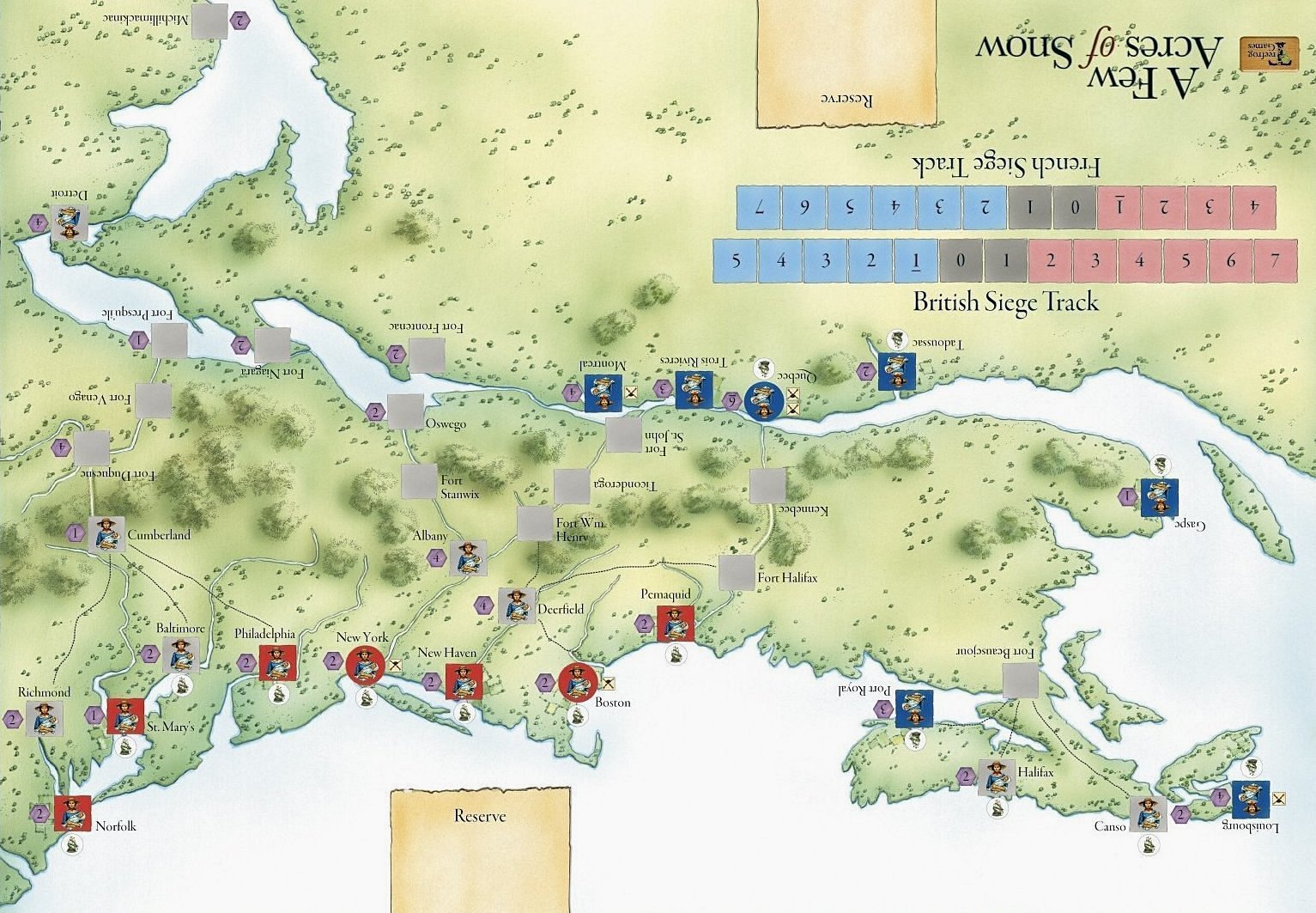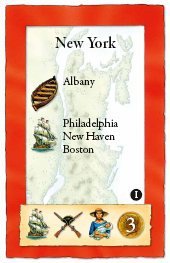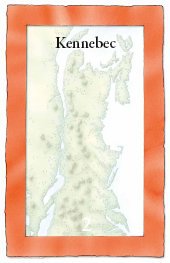 |
| Click for an enlarged picture if you haven't played! |
 First of all, how do you expand your empire? Well, to put a cube down in an empty spot on the board you need 3 or 4 things: to own an adjacent city, to have that city card in your hand, to have the connecting mode of transportation in your hand, and possibly to have a settler in your hand. What do I mean? Well, take a look at the New York card here. It connects to Albany via bateaux and to Philadelphia, New Haven, and Boston via ship. If you look at the map above you'll see all of those spaces have a picture of a pilgrim in the city box. That means you also need a settler to take them. So if you wanted to put a cube in Albany you would need to, in one action, play the New York card, a card with bateaux on it, and a card with a settler on it. You need 3 distinct cards to do so (New York has a settler on it but can't be used for that purpose here since you're using it as the first card).
First of all, how do you expand your empire? Well, to put a cube down in an empty spot on the board you need 3 or 4 things: to own an adjacent city, to have that city card in your hand, to have the connecting mode of transportation in your hand, and possibly to have a settler in your hand. What do I mean? Well, take a look at the New York card here. It connects to Albany via bateaux and to Philadelphia, New Haven, and Boston via ship. If you look at the map above you'll see all of those spaces have a picture of a pilgrim in the city box. That means you also need a settler to take them. So if you wanted to put a cube in Albany you would need to, in one action, play the New York card, a card with bateaux on it, and a card with a settler on it. You need 3 distinct cards to do so (New York has a settler on it but can't be used for that purpose here since you're using it as the first card).How about to upgrade a cube into a disk? To do that you need to play the city card you want to upgrade and a settler card. Note you can only upgrade to a disk in a location worth points. (This is relevant because one of the game end conditions is using all of your disks.)
Now, why would you want to expand you empire? You score points based on the numbers listed on the board. You get to add the location card to your deck when you take a city. You also can get closer to your opponent which opens up possibilities for attacking or raiding. It also opens up two of the game end conditions: running out of cubes and running out of disks. Note that you get the cube back when you upgrade to a disk so if you're trying to rush to game end you'll generally want to upgrade a lot of stuff or nothing at all.
How about potential drawbacks? The biggest one is that you have to take the city card and they're all bad. Ok, bad may be a stretch, but they're pretty much all strictly inferior to your starting cards. Look at New York! It has all sorts of uses. Compare it to Kennebec, shown on the right, which is a literal blank. Now, no other location card is quite that bad but they do all pale in comparison to the power and flexibility of New York. As anyone who play a lot of deck building games will tell you a bigger deck is generally a worse deck. You end up drawing your best cards less frequently because of the length of time between reshuffles. In A Few Acres of Snow that problem is magnified since you don't discard your hand at end of turn. If you add Kennebec to your deck you're stuck with it in your hand turn after turn. You can spend one of your two actions to discard it but it's just going to come back again after you reshuffle. Another problem is that location cards can actually get turned off. You can only use a location card if you still own the location on the board, and if it isn't under attack, and if you can trace a line of supply between your capital and the city. This makes location cards potentially quite vulnerable. One of Andrew's favourite strategies is to somehow destroy the French cube in Trois Rivieres. This shuts down every single card from a city on the west of the board. You can't use those cards as furs for trader. You can't expand out of them. All you can do is discard them futilely. You can turn them all back on by expanding back to the spot but it often takes too long to build the right hand in order to do so, especially if you don't have a lot of cash saved up. Finally while getting closer to the opponent can open up your attacks and raids it does the same for your opponent. If your deck isn't well positioned to fight on those fronts then you could just be throwing points to your opponent.
How about differences between the two factions? The French have the easiest time expanding of the two. There's a big pool of locations along the great lakes which can be easily taken by the French. There are a lot of points available over there and only Detroit requires a settler. Everything is connected by just bateaux and practically every single card you can pick up by doing so has both a fur and a bateaux on it. This means you don't hurt your money engine very badly by picking them up since you maintain a high fur density in your deck and it also means you're not scrambling to build an expanding hand. Your furthest west location card and practically any other location card is good enough. Going in other directions is harder. Nova Scotia has a couple good places with points but they require ships and settlers to take which are harder for the French to put together. They can also head inland towards New England but that has the problem that the first few spaces aren't worth any points at all. Also the cards tend to be worse as they don't all have both a fur and a bateaux. France has real problems with developing into disks. There deck has one settler in it at the start of the game and their unique deck has no more settlers in it. There are two neutral settler cards available for purchase @7 gold each. France actually only has 8 more disks to put on the board and can develop out in a real short amount of time if they manage to buy both neutral settlers and not get killed in the process.
Britain in the other hand starts with 4 settlers in their 7 card deck. They can buy a 5 gold settler from their own deck along with the two neutral settlers. Disking up is not a problem at all for Britain, though they do need to put 10 more into play to end the game. Actually expanding, on the other hand, is trickier. The problem is they're very ship heavy in terms of transportation symbols but there aren't many places to actually go by ship. Nova Scotia is the big one but if you want to head inland you need to start using bateaux of which they have only one to start. And their card pool only contains two more which are feasible to take. (There are a few more on location cards very deep in the opposing territory. You could get to them but I don't think you can plan on doing so very reliably.) One of these is an empire card you buy for 0 gold but is just a bateaux. The other is on the Albany card which itself requires a bateaux to take. On top of that there's even a connection in the British empire that requires a wagon. There is one card in the game which has a wagon on it (Philadelphia) and one connection that uses it (Cumberland to Fort Duquesne). Also a lot of the places Britain wants to go have settler icons. They have settlers to spare so it doesn't really make things harder but it can cause delays as you try to build up the right 3 card combo to expand where you want to go. Also using 3 cards in your first action means you only have 2 cards for your second action which means no big merchant action. Though with a lot of these location cards not having ships or money on them your money engine is taking a huge hit regardless...

No comments:
Post a Comment